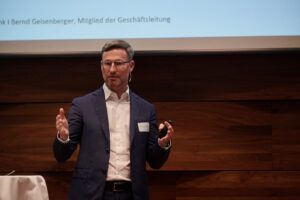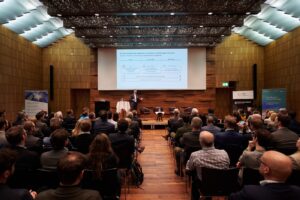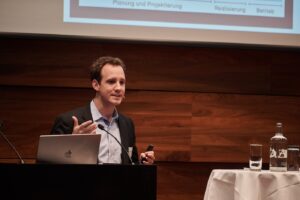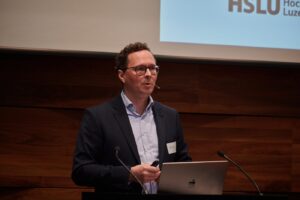Review of the 96th Swiss Real Estate Talk
Should you renovate now despite high interest rates and construction costs? A well-attended real estate panel in Zurich explored this question and came to the conclusion that the reasons for upgrading the energy efficiency of existing properties are not diminishing - quite the opposite. A "game changer" is already casting its shadow.
Under the title "High interest rates, high costs", this year's "Swiss Real Estate Talks" focused on renovation. Unlike new construction, the transformation of existing buildings seems to be flourishing at the moment. This is shown by the figures with which moderator Christian Kraft from Lucerne University of Applied Sciences and Arts opened the real estate round table: the number of planning applications for renovation projects has risen steadily in recent years and is now 43% higher than ten years ago. Calculated on the basis of existing buildings, the refurbishment rate is already an impressive 1.7%. However, these figures do not necessarily indicate that everything is going ideally in the area of refurbishment. Professor Kraft points this out: The average construction sum has fallen noticeably, and smaller measures are being tackled. It cannot be ruled out that some of the brisk refurbishment activity is also actionism and purely due to regulatory pressure. There is also an almost unmanageable jungle of funding pots.
Sustainability as a service
Many property owners are overwhelmed when it comes to planning energy-efficient renovations. This was the starting point for the first presentation of the evening. Clemens Högger, Head of Market Development at Energie 360°, presented assistance. Sustainability as a service - this is how one could summarize what his employer, the former Gasversorgung Zürich, is offering the real estate sector. The city subsidiary wants to help with the switch to emission-free energy and is putting together all-round carefree packages for real estate owners throughout Switzerland. Högger points to the example of two apartment buildings in Olten, where his company not only took on the planning and realization of an energy renovation, but also the risks. Above all, however, Energie 360° also offers solutions for entire areas and in networks - the keyword here is district heating, which is intended to largely replace Zurich's natural gas infrastructure. The advantage of the system for the building owner is obvious: the heat comes from outside and hardly any space is needed for technology inside the building. Another interesting option for property owners is to take advantage of the financing as a service. For example, as part of a contracting model: the service provider takes care of everything, starting with the planning, while the property owner simply buys the finished, emission-free energy. The base price is used to discount all construction and operating costs for the energy infrastructure over the term, including risk premium, interest and depreciation. Even replacement investments for failed components are covered.
Högger advocates that refurbishment should not be seen purely as a cost factor. It is an investment that - like any other investment - has to yield a return. Coming from a company that acts as an investor in sustainability and has to shoulder risks itself, this does not sound like a mere soapbox speech. Högger also tried to encourage real estate owners with another thesis: The added value of sustainability can be measured in a property, he said, in the context of determining value according to the hedonic model.
Substance, not label
The next speaker came at just the right time. Roman Ballmer, the deputy CEO of data specialist Iazi AG, is head of the hedonic valuation division. The question of whether the sustainability of a property can be measured was therefore in good hands with him. And he immediately cleared up an obvious misunderstanding. Contrary to what many people believe, sustainability is not an aspect that has to be assessed separately. Rather, it has always been part of real estate valuation, and has been since the beginning of the hedonic model. Anyone looking for sustainability can find it in various places, for example in the micro-location factor. If the proximity of a property to the nearest playground is included in the valuation, the "social" aspect from the "ESG" formula is also included, says Ballmer. It is similar with the energy sustainability of the property: this has already been included in the value calculation based on the renovation status and age. According to Ballmer, the sustainability of a property is therefore closely linked to its value, but not in the way that many people imagine. And above all, it is not because of the Minergie label. According to Ballmer, the statistical effect of certification is just 1 to 2 %. He explains this as follows: "Better energy efficiency is the result of good building fabric, not a label. And because the standards for buildings are generally rising, the effect of the label tends to diminish. Ballmer's next finding is also interesting: the value effect of the condition of the building has declined in recent years. In other words, buyers attached less importance to the aspect of sustainability in 2023 than in 2015. This was due to the investment crisis; investors are looking for returns, and the renovation backlog in real estate has lost its deterrent effect. Ballmer's data even shows that poorly renovated properties have been overpaid for more than other properties.
A confirmation for those who refuse to reorganize? Ballmer did not want this look in the rear-view mirror to be understood in this way. Buyers may have recently shown themselves to be quite painless when it came to suboptimal energy efficiency, but there is no guarantee that this will remain the case. The relationship between supply and demand can change. And the energy update also serves to maintain value and living comfort, thus enabling higher rental prices and can ensure lower costs. But the most important aspect for Ballmer is this: Who knows what else politicians have up their sleeve in terms of regulation? Will there perhaps be a CO2-Penalty? There are many big unknowns - and as we all know, life likes to punish those who don't take precautions. Which brings us to the next presentation. In it, this topic came up again.
Gamechanger on the financing side
The presentations were concluded by Bernd Geisenberger, Head of Corporate Banking at Migros Bank. He tried to give an insight into the inside of the "black box bank". This was extremely interesting, as there is a lot going on behind the scenes in the banking world at the moment. Everyone will have noticed the turnaround in interest rates, and the harbingers of Basel 3 are already making themselves felt, although the new capital requirements will not come into force until the new year. However, there is another potentially momentous development: "carbon accounting" is coming for banks. The regulator wants to oblige banks to take emissions into account when granting loans. By accounting for these according to "Scope 3", the CO2-footprint of every financed property has become a relevant factor in the bank's business. "This is a game changer, and that's what the regulator wants," said Geisenberger. The good news for the real estate sector is that the process is only just beginning and many questions remain unanswered for the time being. But the banker warns against playing for time. Sooner or later, the new rules will also affect existing properties. Under these circumstances, non-sustainable properties could have to pay a premium - if it is still opportune for the bank to finance them at all.
The implementation of Basel 3 already shows this: The resource of financing is becoming scarcer, and owner-occupied housing - favored by the regulator - has a clear advantage. "The financing of investment properties is therefore in competition with the financing of owner-occupied housing," says Geisenberger, adding that financing may have to undergo due diligence in terms of sustainability. This could present banks, which are known to place a lot of emphasis on reliable customer relationships, with some difficult decisions. It is already apparent that banks will have to find their own individual ways through the new terrain. "Don't be surprised if you see greater differences in interest rates between banks in the coming months," says Geisenberger. The time of similar conditions that we have seen in recent years is over, the offers are becoming broader. "The range will be just as broad when it comes to sustainability later on." The pressure to adapt is still limited. Geisenberger believes that the immediate increase in the cost of loans as a result of Basel 3 could be offset by a downward move in interest rates. But people would be well advised to prepare for completely new scenarios. His advice: "Even if you were not motivated to approach the topic of sustainability - it would make sense from a financial perspective alone". (aw)


























